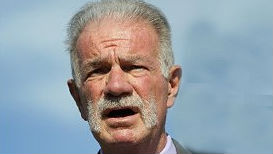Politics & Current Affairs
All Stories
Aung San Suu Kyi: “Human beings want to be free and however long they may agree to stay locked up, to stay oppressed, there will come a time when they say ‘That’s it.'”
His agnosticism would make him a completely untenable candidate in modern times, especially within the Republican party.
This is a column that starts out being about horse whispering and ends up being about leadership and politics. Move forward when there’s acceptance, pull back when spooked…
The more unwilling Binyamin Netanyahu is to make a leap of history, the more dangerous it’s going to get.
Out of the United Nations comes a new idea for ending war. Peacebuilders: An intensive process that gives permission for foreign “interference” in aiding conflict resolution.
No government has yet taken the next step of reshaping its policies to promote happiness, but clear patterns reveal that low taxes, freedom of speech and equality are good for wellbeing.
From Wisconsin to Libya, Egypt and Japan, the world has truly crashed through our front door. We need to get more comfortable with uncertainty because this is what the future looks like.
Air Force Major General Margaret Woodward is in charge of the U.S. air strikes in Libya and the first woman in U.S. history to oversee an air campaign.
The Economist says that Japan’s many-headed catastrophe points to deeper-seated problems, ineffective leadership and political dysfunction.
People were surprised when all the major unions suddenly stepped up as being against patent reform. A lawsuit shows there was a lot going on behind the scenes…
Football is a game, and when one is playing, he always tries to cheat a little bit. So says FIFA president Sepp Blatter, now facing a leadership rival in old pal Mohamed bin Hammam.
Politics can be a pounding vocation but it is more than a lust for recognition and power. It can be a profession marked by candor and service.
Mark Malloch Brown, a former Assistant UN Secretary General and former UK Foreign Office Minister has today claimed in The Independent newspaper in London that the the ‘great diplomatic triumph’ […]
Never has postwar Japan needed strong, assertive leadership more — and never has its weak, rudderless system of governing been so clearly exposed.
Christopher Hitchens has a wary prognosis for the Egyptians who thronged Tahrir Square: they likely haven’t got the resources to break the chains of tyranny.
The disquieting truth is that the president seems unable to deal quickly and decisively with breaking global events. Obama’s biggest burden seems to be the presidency itself.
Beyerstein’s take on Newt Gingrich: he was really into America, but he was freaked out because she was way more sexually experienced than him.
Political paralysis in Brussels, monetary tightening by the ECB and soaring rates for Portuguese, Irish and Greek bonds — the omens for the Eurozone summit are not good.
What are the implications of the Dalai Lama’s decision to drop his political role while the
Tibetan government in exile fears it is not ‘competent’ to take over from figurehead?
Having a positive concept of the national interest is what produces the element that’s missing from the Obama policy: national initiative.
David Van Reybrouck predicts the underlying causes of Belgium’s political crisis will repeat themselves elsewhere as the new media call into question established democratic practices.
David Bornstein on how the “collective impact” strategy of creating alliances of civic and business leaders is being applied to social problems across the nation.
Michael Desch, Professor of Political Science at the University of Notre Dame, speaks to the importance of the Israeli-Palestinian Peace Process to America’s national security interests.
What are the causes of anti-Muslim sentiment in the U.S. today? Scott Appleby, Professor of History at the University of Notre Dame, identifies three causes.
This drone-like computer virus, radically different and far more sophisticated than others seen before, appears to have attacked Iran’s nuclear program. Its source remains a mystery.
The economist and former World Bank analyst explains how disastrous his former employer’s policies have been for the developing world, amounting to “a punch in the face” for the poor.
In a series of farewell speeches that recall President Eisenhower’s warnings against the military-industrial complex, Defense Secretary Gates says the military needs sizable reform.
Here’s what Democrats should be saying: Hike taxes on the super-rich. Reform the tax code to create more brackets at the top with higher rates for millionaires and billionaires.
American ships are again under siege by pirates off the African coast. The Pirates of Somalia — we have the weapons to defeat them. All we lack is the will.





